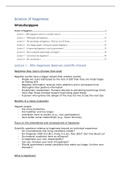Science of happiness
Inhoudsopgave
Science of happiness................................................................................................................................................1
Lecture 1 - Why happiness deserves scientific interest........................................................................................1
Lecture 2 – Philosophy and happiness...............................................................................................................10
Lecture 3 – The psychology of happiness: Theories of well-being....................................................................15
Lecture 4 – Very happy people: striving for greater happiness.........................................................................23
Lecture 5 – Is improving happiness a task of government?...............................................................................33
Lecture 6 – Does saving the planet make you happy?.......................................................................................42
Lecture 7 – Can money buy happiness?.............................................................................................................48
Lecture 8 – Me, myself and I..............................................................................................................................53
Lecture 1 - Why happiness deserves scientific interest
Negativity bias: bad is stronger than good
Negative events have a bigger impact than positive events:
- People are more distressed by the loss of $50 than they are made happy
by finding $50
- Negative information receives more attention and is processed more
thoroughly than positive information
- Evolutionary explanation: Humans attuned to preventing bad things thrive
more than those oriented toward maximizing good things
- A person who ignores the danger of fire may not live to see the next day
Benefits of a happy population
Happier people…
- Are more productive
- Are healthier and live longer
- contribute more to society (e.g., civic participation)
- have better social relationships (e.g., fewer divorces)
Focus on the antecedents and consequences of happiness
Scientific questions relating to happiness beyond an individual experience
- Do circumstances and living conditions matter?
- For Diogenes (404-323 BC), living in a jar, they didn’t. But how about us?
- Do material conditions have an influence?
- Is happiness your own responsibility?
- Can you increase your level of happiness?
- Should government create conditions that make you happy (in their own
interest)?
What is happiness?
, - “a state of well-being and contentment”
- “the experience of joy, contentment, or positive well-being, combined with
a sense that one’s life is good, meaningful, and worthwhile”
(Lyubomirsky ,2008)
- “Good mental states, including all of the various evaluations, positive and
negative, that people make of their lives and the affective reactions of
people to their experiences” (OECD, 2013)
- “Happiness is a feeling of pleasure and positivity.” (‘in simple words’)
Is happiness an elusive concept?
- JINGLE - Common terms refer to different underlying conceptions:
happiness refers to life satisfaction, positive affect, well-being
- JANGLE - Different terms are used to describe common underlying
conceptions: happiness, life satisfaction, meaning in life, well-being
Hedonic/subjective well-being as a composite of 3 related but distinct facets
(triparte model) EXAM QUESTION
- Cognitive Life evaluation – a reflective assessment on a person’s life or
some specific aspect of it: general satisfaction with life or domain-specific
satisfaction with marriage, work, friendship, leisure, the weather ...
- Positive Affect – a person’s feelings or emotional states, typically
measured with reference to a particular point in time (momentary): e.g.,
excited, interested, enthusiastic
- Negative Affect – a person’s feelings or emotional states, typically
measured with reference to a particular point in time (momentary): e.g.,
nervous, afraid, irritable
Eudaimonic well-being
Eudaimonia – a sense of meaning and purpose in life, or good psychological
functioning
,Eudaimonic – actualization of one’s potential by fulfilling one’s daimon (true
self) = flourishing
As different from
Hedonic/subjective well-being = with a focus on affect (maximixation of
pleasure & minimization of pain) and cognition
A bit of concensus and (quite) a bit of controversy
Consensus: two main approaches
Hedonic well-being = Satisfaction with Life + Presence of momentary positive
affect + Absence of negative affect
Eudaimonic: Purpose and Meaning in Life
Controversy
What is the best indicator of ‘happiness’: hedonic or eudaimonic measures? But
note that in policy making focus lies on hedonic/subjective well-being.
If and how do people account for their living conditions (financial and immaterial)
when reporting on happiness?
How can we know someone is happy
Generally, we ask people to self-report how happy they are
Alternative measures of happiness:
- Duchenne smiling with your eyes as a genuine indicator of positive affect
(unfakable)
, - Genuine smiles in college yearbook pictures predicted marital satisfaction
decades later
- Recording behaviors that involve gratitude or acts of kindness
Easy to tell?
People in the Midwest of the US think people living in California will be happier
than themselves – while in fact they are equally happy.
Focus on the weather while sunshine doesn’t make you happy
Happiness is a biased judgment: people estimate their own happiness level by
(too much) focus on one particular
Or they underestimate other people’s happiness
People tend to be positive about themselves, but negative about other people
they don’t know. They may be optimistic about their own future, while at the
same time being pessimistic about the future of their nation
Focus on self-report
- Depsite disadvantages of self-report (social desirability, problems
associated with introspection)
- People are able to report on their feelings in metrics
- After all, happiness is about subjective wellbeing – so why not ask people
themselves?
Single items
Systematic comparison of various measures in World Happiness Report showed
nearly identical results for several measures
Cantril’s Ladder (single item) produced somewhat lower mean scores than
measures with multiple items
Multiple items reduce random error from ambiguity in single items
Multiple item questionnaires





